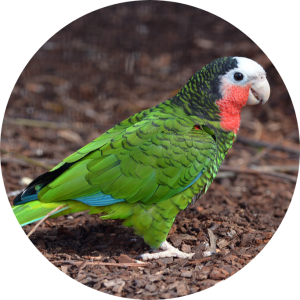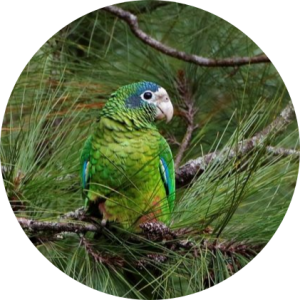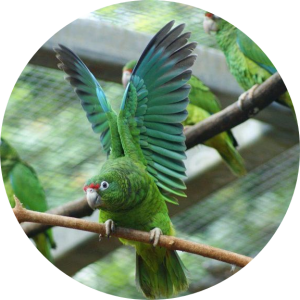Amazon Parrot Guide and Information

Contents about Amazon Parrot
Description Of Amazon Parrot
Interesting Facts About the Amazon Parrot
There are many different species of Amazon Parrots. Learn what makes this group interesting and unique below.
- Top Talkers – These birds are some of the best at mimicking words and sounds. They are intelligent, and some individuals have incredibly wide vocabularies. Because of this, they are one of the more popular groups of pet parrots.
- Popular Pets – Sadly, being a popular pet sometimes means devastation to wild populations. Of the numerous species, the IUCN lists 9 as Near Threatened, 10 as Vulnerable, 8 as Endangered, and 1 as Critically Endangered. Capture for the pet trade, along with habitat destruction, reduces parrot populations.
- Zygodactyl Toes – Like all parrots, these birds have rather odd shaped feet. Their toe arrangement is different from those of other types of birds. Most bird species have 3 toes facing forward, and 1 facing backward. Parrots have zygodactyl toes, or 2 facing forward and 2 facing backward. These unique feet help the parrots climb up and down branches.
Amazon Parrot Behavior
Amazon Parrots are very social birds and a single parrot will make a wonderful pet if it gets plenty of attention. They adapt well to captivity, adjusting easily to their cage or aviary. These birds will tame quickly, bond to their keeper, and may soon begin to mimic the sounds. They enjoy interaction and like their human companions.
Although Amazons make affectionate and loyal companions, they are not for everyone. They have a very long life span, 50 years (or more) in captivity. Most Amazon birds available as pets are only a generation or two away from their wild counterparts. These parrots still have their wild nature intact and can be unpredictable at times. Though they are desirable pets they require devotion and commitment from their keepers.
Amazon parrots need good socialization and training when young, and regular ongoing interaction and training. Behavior problems usually stem from something missing in the bird’s environment. Boredom, lack of trust, lack of interaction with other birds or people can lead to problems like biting, feather plucking, and screaming. A bond of trust, providing a stimulating environment, and spending time with your bird can help avoid these problems.
Amazons can mix very successfully with children if the parrot gets used to the child. However some Amazons can become extremely jealous of small children. It’s best to always be on your guard and supervise them when together. The same is true for other family pets, they may do very well, but again be cautious. Small pets and small birds can especially be at risk.
In the wild, Amazons live in colonies, but mate for life with just one other bird. Living with a mate is part of the social pattern of the Amazon parrot. To live well, they need close companionship. They go through a hormonal stage as they reach maturity, generally starting at about 4 – 5 years and lasting for a couple of years or longer. During this period they can become restless or distressed, and may start demonstrating undesirable behaviors like feather plucking or screaming. This period will require even more personal attention from their keeper, or perhaps pairing it with a mate.
As your pet Amazon reaches sexual maturity, this may be the time to consider getting a mate for your parrot. This is primarily true if it seems to be distressed and you cannot spend more time with it. Sometimes pairing is the only satisfactory solution even if you do spend more time with it and it still remains distressed. This will depend a lot on you and your bird. A mate does not diminish the bond of trust formed with its keeper, but provides a new experience for both. Overall Amazon birds are very affectionate loyal companions, but definitely require devoted, experienced parrot owners.
Breeding of the Amazon Parrot
Like most parrots, Amazons are monogamous, and continue to breed with the same partner year after year. Pairs remain close even outside of the breeding season when they join a larger flock. They nest in holes or cavities in trees rather than building their own nests.
Most clutches contain just one or two eggs, depending on the species. The female incubates the eggs for about two or three weeks. It takes about two months for the young to learn how to fly, and they remain dependent on their parents for another month or so.
Care & Feeding
Most Amazon parrots love to bathe; and bathing opportunities can include joining their owner in the shower, getting a spray bath, or jumping in their water dish and splashing water all about. Bathing is an important part of an Amazon’s feather health. Because of their love of food and their habit of begging for table foods from their owners, Amazon parrots tend to tip the scales toward being overweight. An Amazon parrot needs a spacious cage with toys and swings spread out, as well as a play gym/play tree, climbing rope and/or ladders to scale to encourage movement and exercise.
- Bird Food:
Foods available for Amazon parrots include formulated diets, either pelleted or extruded, seed only diets, and parrot mixes which offer a mixture of both. There are pros and cons to feeding only a formulated diet as well as feeding only a seed diet. A seed only diet offers much more variety but requires additional vitamin and calcium supplements. Amazon parrots need not only nutritional requirements met but also variety for psychological enrichment.- Formulated Diet:
A formulated diet provides a good nutritional base so does not require the addition of vitamins, however it does not contain the phytonutrients (antioxidant pigments) that are found in vegetables, fruits, grains, and seeds. Phytonutrients are believed to boost the immune system, help a body to heal itself, and to prevent some diseases. Also Amazons can become bored with it due to the lack of variety. - Seed Diet:
A seed only diet offers much more variety but requires additional vitamin and calcium supplements. Amazon parrots need not only nutritional requirements met but also variety for psychological enrichment.
- Formulated Diet:
- Supplements:
Supplements are very important and can be put in an extra dish and rotated for variety- Fruits and Vegetables:
Supplements should include sprouted seeds, all types of fruits such as apples, pears, plums, cherries, grapes, oranges, bananas, mangos, papayas, and even berries such as strawberries and blueberries. Vegetables are also good supplements such as carrots, cucumbers, zucchini, many garden vegetables, and even dandelions and chickweed.
NOTE: Amazons are prone to vitamin A deficiency so high foods like dark green leafy veggies, carrots, mangos and sweet potatoes will help insure a long life for your bird. Do not feed avocado as it may be toxic to birds! - Proteins:
.Additional proteins can be offered about every 1 1/2 weeks such as cottage cheese, hard boiled eggs, and even canned dog food.
- Fruits and Vegetables:
- Water:
Give your Amazon fresh drinking water every day. - Bird Baths:
The personal hygiene of your Amazon includes a weekly shower to help keep it’s plumage in good shape. This can be accomplished with either a hand held shower sprayer or a hose with a fine spray head and lukewarm water
Types Of Amazon Parrots



